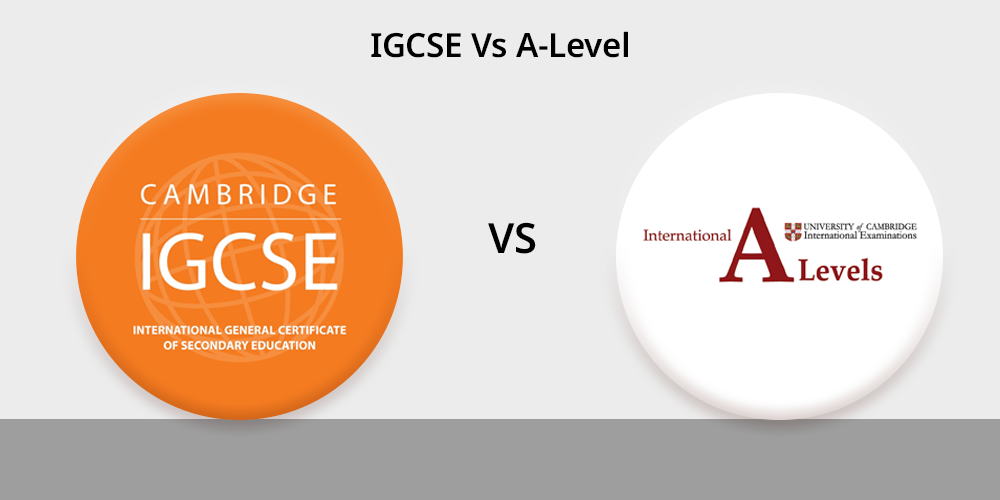
Choosing a curriculum is one of the biggest decisions a student must make during their academic journey. Among the most prominent international curricula are the IGCSE and A-Level programs.
Though similar, as both are offered through Cambridge and other reputable boards, they are vastly different in the way they are structured, depth of fulfilment and the goals to be achieved.
Explore in detail about a-level grading system .
In this blog, we will unpack the main differences between the IGCSE and A-Level curricula, to help guide students and parents on their next move based on their academic aspirations.
Contents
What is the IGCSE Curriculum?
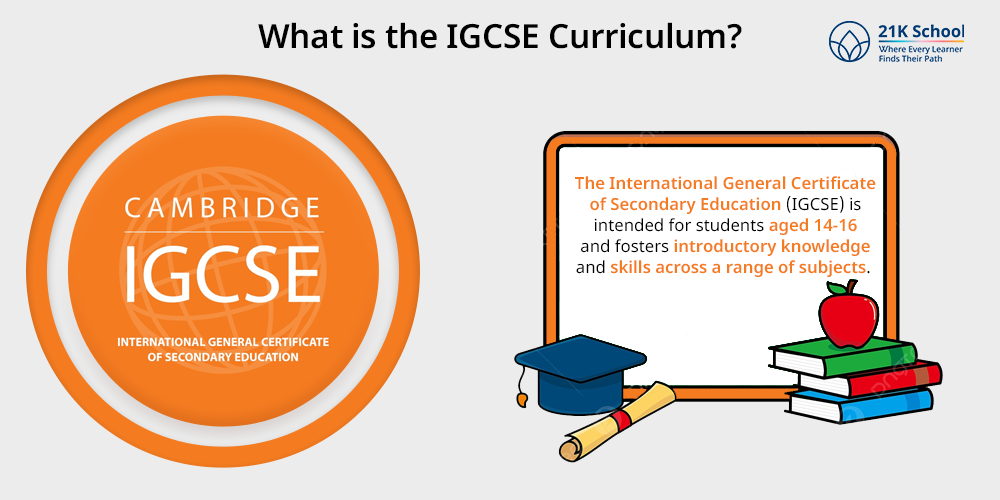
The International General Certificate of Secondary Education (IGCSE) is intended for students aged 14-16 and fosters introductory knowledge and skills across a range of subjects.
Typically, course size is not greater than 20; core subjects contain creative, practical, and, for many students, work-related courses.
IGCSE is founded upon inquiry and develops critical thinking along with a wider understanding of concepts. Subjects are assessed through an array of methods: written exams, coursework, and oral tests.
This board is globally recognised and is a stepping-stone to other academic formal qualifications such as A-Levels, International Baccalaureate (IB) Diploma, or national curricula of other countries.
It offers over seventy subjects, including thirty languages, enabling students to select the combination of subjects that is meaningful to their interests and plans.
What is the A-Level Curriculum?
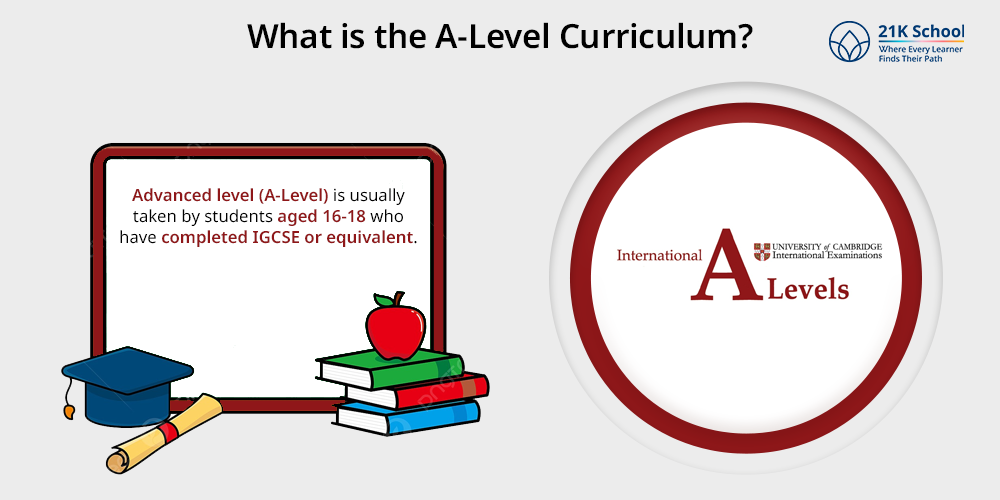
Advanced level Curriculum (A-Level) is usually taken by students aged 16-18 who have completed IGCSE or equivalent. It is a more specialised, academically demanding program. Students take three or four subjects and study them in depth over two years.
The A-Level system is divided into AS Level (first year) and A2 Level (second year).
This program is intended to equip students with the skills for higher education and focuses on analytical thinking, subject mastery, and independent learning, which provides autonomy in studying.
A-Level is most common in the UK, but is also widely accepted in Australia, Canada, India, Singapore and throughout Europe. This curriculum gives students the academic preparation to compete for placements at the world’s leading universities.
Understand a levels what they are and how they work .
Key Differences Between IGCSE and A-Level
IGCSE and A-Levels are both part of the British curriculum, but they differ significantly in their target age groups, academic focus, and difficulty level.
Let’s dive deeper into the various points of difference for the two curricula:
| Feature | IGCSE | A-Level |
| Age Group | 14 to 16 years | 16 to 18 years |
| Subject Range | Broad (5–10 subjects) | Narrow (3–4 subjects) |
| Curriculum Depth | Foundational and general | In-depth and specialised |
| Assessment Style | A mix of exams, coursework, and practicals | Primarily written exams |
| Duration | 2 years | 2 years |
| Recognition | Internationally recognised | Highly recognised by universities |
| University Readiness | Prepares for further study | Directly supports university applications |
| Career Relevance | Limited | High |
| Average Cost | Moderate | High |
Learn the detailed comparison between a-level vs cbse .
1. Curriculum
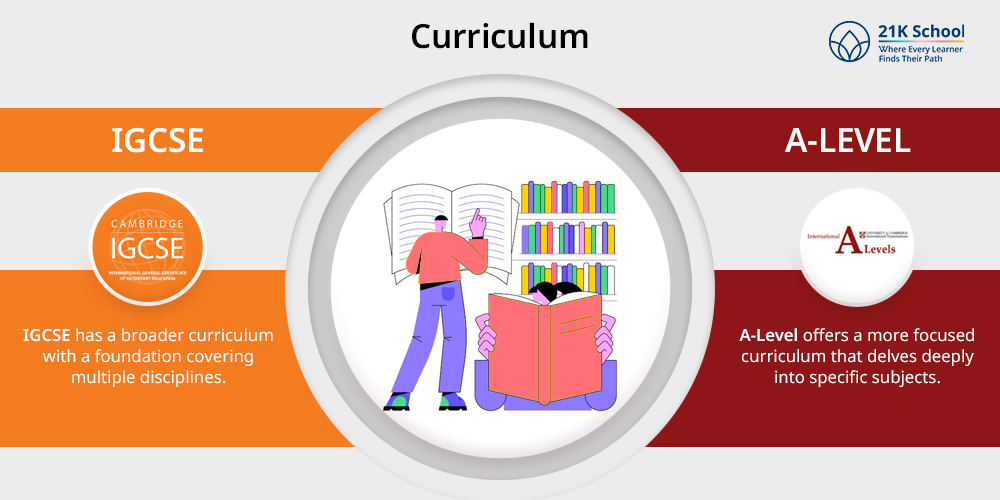
IGCSE has a broader curriculum with a foundation covering multiple disciplines, such as languages, sciences, mathematics, humanities, and arts.
It serves as an introduction to a variety of subjects, and most students learn about their interests and strengths through this curriculum.
In contrast, A-Level offers a more focused curriculum that delves deeply into specific subjects. This allows students to concentrate on areas of interest and often their chosen field of specialisation.
A-Level expands upon the knowledge acquired in IGCSE, providing students with a more comprehensive understanding of topics that are generally relevant to their future degree or career aspirations.
2. Subject Choices and Flexibility
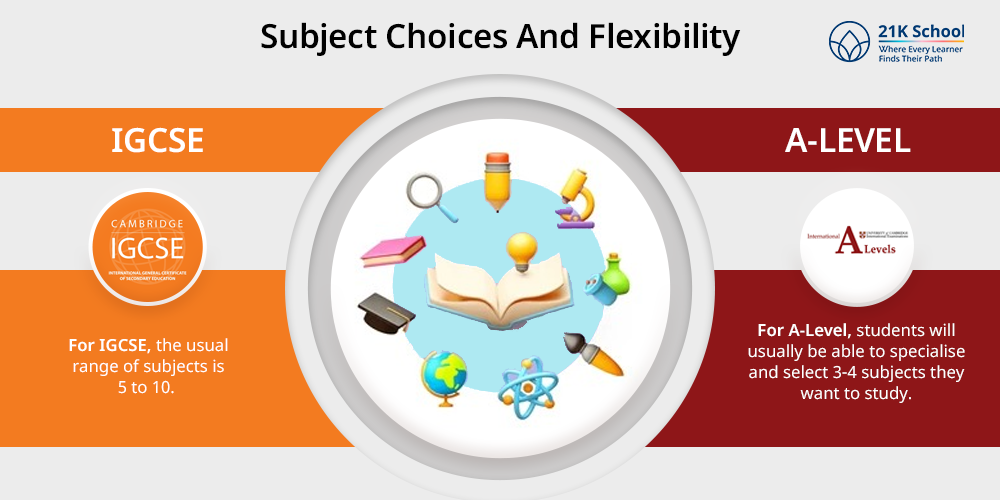
For IGCSE, the usual range of subjects is 5 to 10, and while these subjects often include compulsory core subjects (English, Mathematics, and Science) they also include five electives, such as Business Studies, Information and Computer Technology, and Art.
For A-Level, students will usually be able to specialise and select 3-4 subjects they want to study, giving them more flexibility as they have a clearer idea of their career path or university options.
For example, if a student is planning on studying engineering, they will usually take Physics, Mathematics and Chemistry as their A-Level subjects, and if they were interested in going into the Humanities, they could be studying English Literature, History, and Psychology.
3. Assessment and Examination Styles
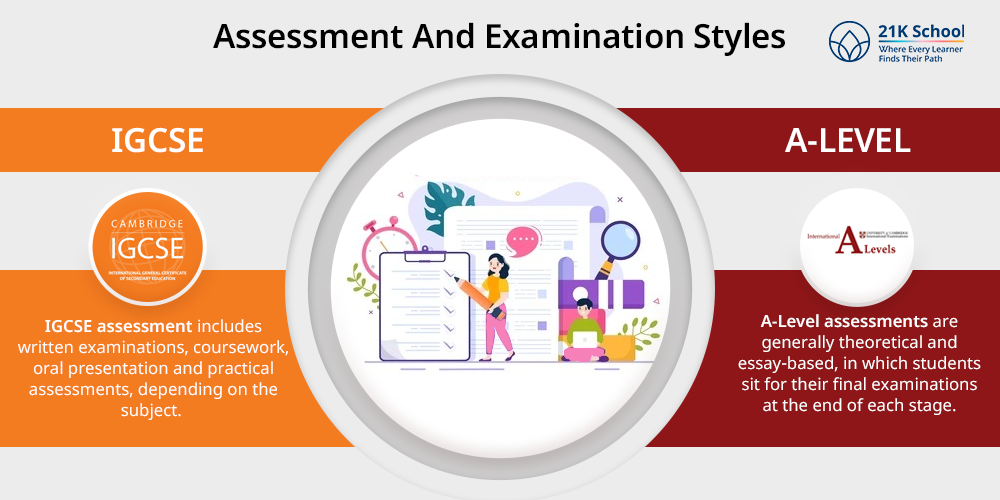
IGCSE assessment includes written examinations, coursework, oral presentation and practical assessments, depending on the subject.
A-Level assessments are generally theoretical and essay-based, in which students sit for their final examinations at the end of each stage, AS and A2.
4. Depth of Knowledge and Academic Rigour
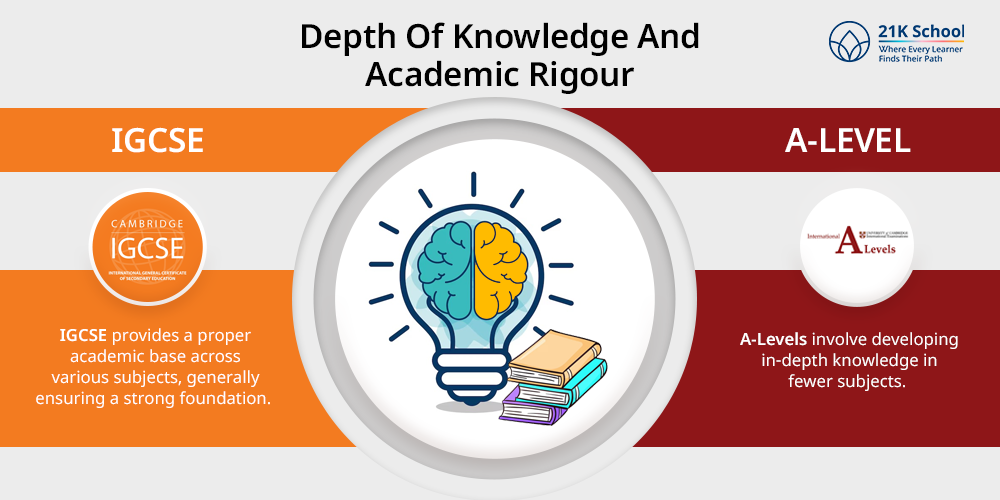
IGCSE provides a proper academic base across various subjects, generally ensuring a strong foundation. It is significantly useful for students who are still developing their interests.
A-Levels involve developing in-depth knowledge in fewer subjects. Many students will describe A-Levels as having significantly higher demands in terms of content and expectations, comparing it to studying for the early stages of an actual university post-secondary course.
5. Age Group and Academic Level
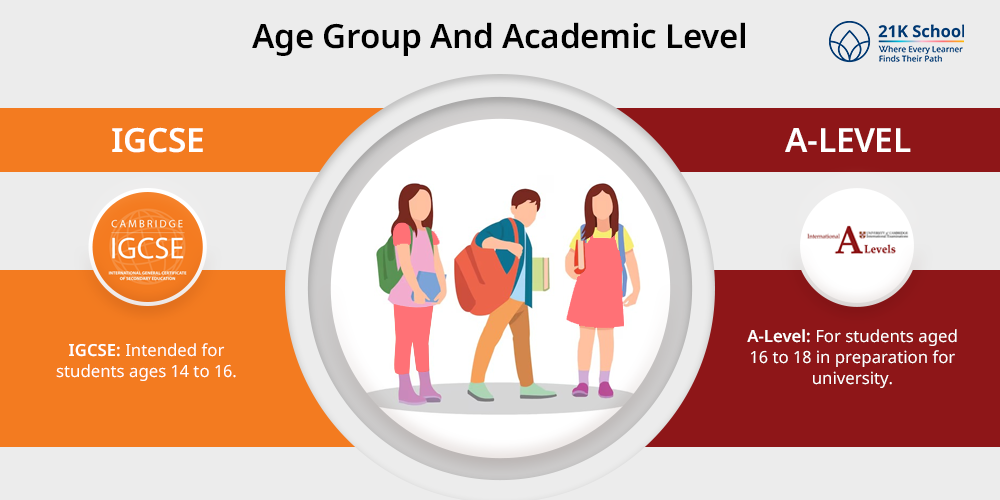
IGCSE: Intended for students ages 14 to 16.
A-Level: For students aged 16 to 18 in preparation for university.
The transition from IGCSE to A-Level is a natural progression because IGCSE is a foundation phase, and A-Level is the pre-university phase.
6. Global Recognition and University Acceptance
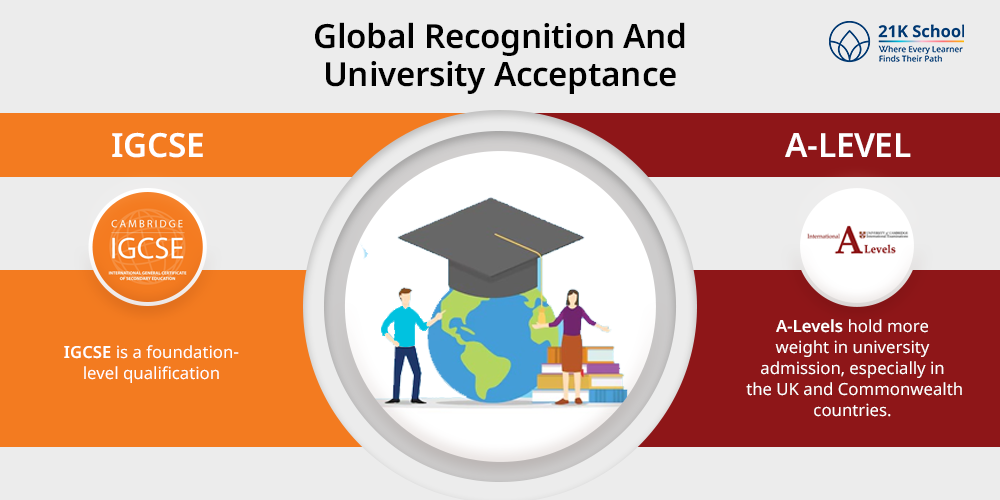
Both IGCSE and A-Level are recognised globally, meaning they are equal in validity by universities, colleges, and employers. However, A-Levels hold more weight in university admission, especially in the UK and Commonwealth countries.
Although IGCSE is a foundation-level qualification for A-Level or equivalent, A-Level results form an essential part of university entrance criteria.
For example, prestigious institutions such as Oxford, Cambridge, and some Ivy League schools accept A-Levels for entry into their universities.
7. Higher Education and Career Pathways
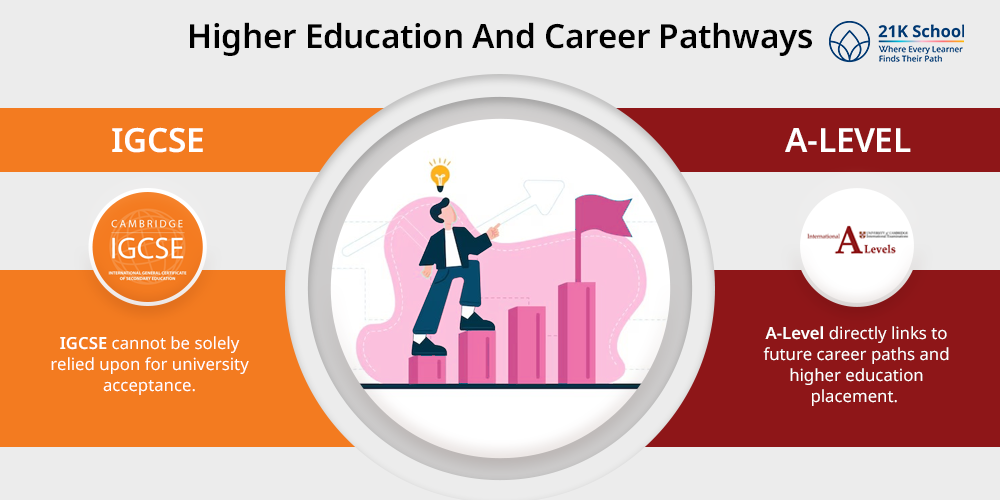
IGCSE cannot be solely relied upon for university acceptance, as it is a transitional qualification to A-Level or equivalent pathway.
A-Level directly links to future career paths and higher education placement. It is recognised globally and gives graduates an advantage in their professional fields.
The potential for A-Level graduates in other countries is very encouraging, as many universities offer advanced placement, scholarships, or exemptions.
8. Costing
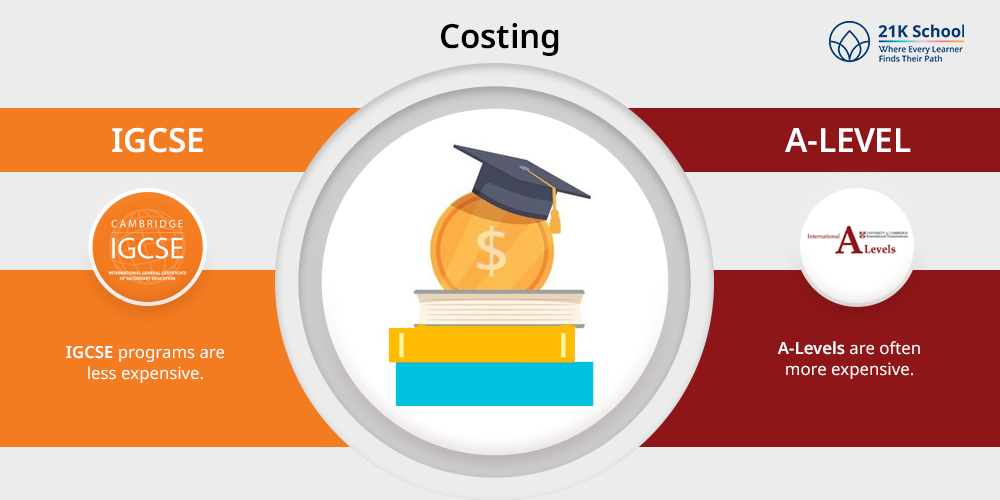
The costs associated with education vary depending on the school and region. Generally speaking, IGCSE programs are less expensive because they cover many subjects at a foundation level.
A-Levels are often more expensive because of the resources needed for the deeper study of those subjects. Furthermore, teachers often have to have specific expertise in certain subjects, and this will affect overall tuition and support costs.
Explore about a-level past papers .
Conclusion: Which Is Better, IGCSE or A-Level?
IGCSE and A-Level aim to offer students different stages in their academic career.
If you want a broad and flexible secondary education that allows you to build core skills and knowledge, IGCSE is for you. If you want to specialise and focus on topics in depth that relate to your future career path, then A-Levels are a better option.
Those who complete IGCSE go on to take A-Level in the majority of cases. As a result, the two qualifications can be viewed as complementary, not competitive.
Some students may also choose to switch to other systems like the IB Diploma after IGCSE, based on their preference, but A-Level remains the preferred and more widely respected academic path due to its inherent structure and depth.
Your next read: A levels vs IB
Choosing the right curriculum requires a lot of thorough research and open communication amongst the student, parents, educators and even counsellors to ensure the right choice is made.
Talk to educational advisors, check out career interests early, and examine the university admissions standards of the countries you want to study in.
The right pathway for you is the one that suits your goals and helps you grow into a confident, capable and accomplished learner.
